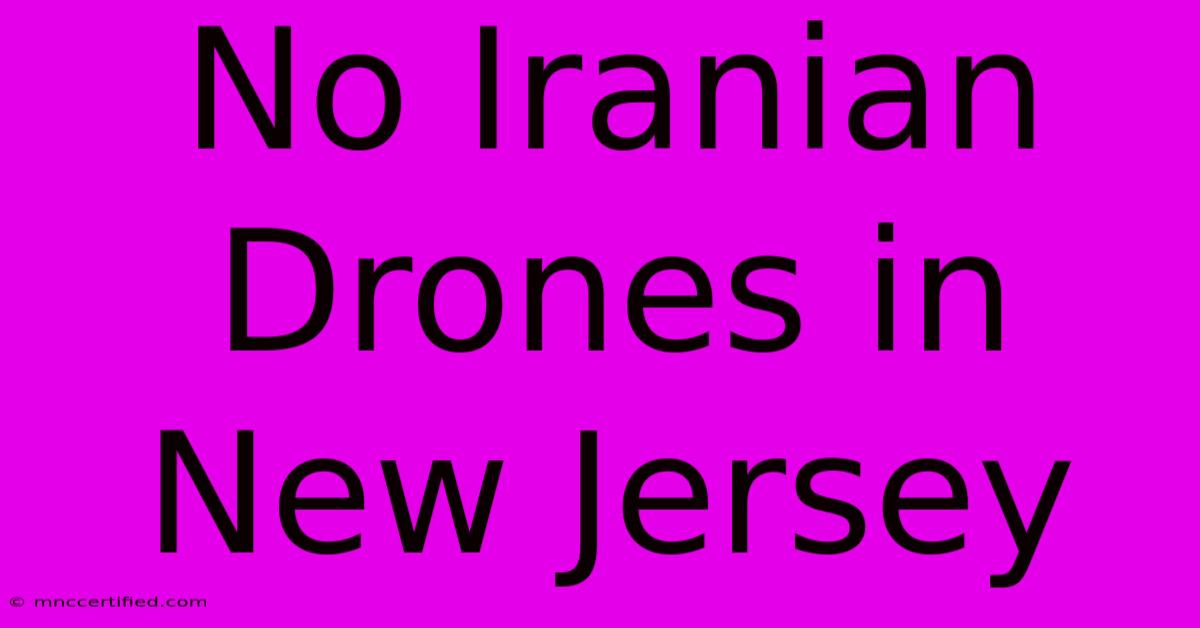No Iranian Drones In New Jersey

Table of Contents
No Iranian Drones in New Jersey: Debunking the Misinformation
The recent claim of Iranian drones being spotted in New Jersey has sparked widespread concern and fueled online discussions. However, a thorough investigation reveals this claim to be false and unsubstantiated. This article aims to debunk this misinformation, examine the origins of the rumour, and highlight the importance of verifying information before spreading it online.
The Absence of Evidence: Why the Claims are Unlikely
The crucial element missing from the claims of Iranian drones over New Jersey is concrete evidence. No credible sources – government agencies, law enforcement, or reputable news outlets – have confirmed sightings or provided any supporting data. Claims circulating online typically lack verifiable sources, relying instead on anecdotal evidence or manipulated images. This lack of evidence should raise immediate red flags. The absence of confirmation from official channels strongly suggests the claims are unfounded.
Analyzing the Sources of Misinformation
The spread of this misinformation likely stems from a combination of factors:
- Social Media Amplification: Social media platforms, while powerful tools for communication, can also facilitate the rapid dissemination of false information. Unverified claims can go viral quickly, reaching a wide audience before being debunked.
- Geopolitical Tensions: Existing geopolitical tensions between the United States and Iran can create an environment where such rumours easily gain traction. Concerns about national security can make people more susceptible to believing unsubstantiated claims.
- Lack of Media Literacy: A lack of critical thinking skills and media literacy can contribute to the spread of misinformation. Individuals may not critically evaluate sources before sharing information online.
The Importance of Fact-Checking and Responsible Reporting
In today's digital age, it is more crucial than ever to be discerning consumers of information. Before sharing any news, especially sensational claims, it’s essential to:
- Verify the Source: Check the credibility and reputation of the source. Is it a reputable news organization, a government agency, or a known expert in the field?
- Cross-Reference Information: Confirm the information from multiple independent and reliable sources before accepting it as true.
- Look for Evidence: Does the information provide concrete evidence, such as photos, videos, or official statements?
- Be Wary of Sensational Headlines: Sensational headlines often aim to grab attention rather than present factual information.
Protecting Against the Spread of Disinformation
Combating misinformation requires a collective effort. We must all play a part in promoting responsible online behaviour:
- Think Before You Share: Pause and consider the source and evidence before sharing any information online.
- Report False Information: If you encounter false information online, report it to the relevant platform.
- Promote Media Literacy: Encourage critical thinking and media literacy skills among friends and family.
In conclusion, there is no credible evidence to support claims of Iranian drones being present in New Jersey. The spread of this misinformation highlights the importance of fact-checking, responsible reporting, and critical thinking in navigating the digital landscape. By promoting media literacy and responsible online behaviour, we can collectively combat the spread of disinformation and foster a more informed society.

Thank you for visiting our website wich cover about No Iranian Drones In New Jersey. We hope the information provided has been useful to you. Feel free to contact us if you have any questions or need further assistance. See you next time and dont miss to bookmark.
Featured Posts
-
Kiwior Out Arsenals Lineup
Dec 12, 2024
-
Facebook And Instagram Offline Downdetector Reports
Dec 12, 2024
-
Bidwell Mansion Fire Chico Icon Lost
Dec 12, 2024
-
Pena Reveals Flicks Barcelona Game Plan
Dec 12, 2024
-
Portsmouth Millwall Match Latest Arrest News
Dec 12, 2024